Clan Of Brothers: The 4 Chambers Of ‘Wu-Tang: An American Saga’s’ Final Season

Upon the show’s introduction in 2019, Wu-Tang: An American Saga was billed as a fictionalized account of the Wu-Tang Clan’s rise from the slums of Shaolin to international acclaim.
Giving the story behind one of Hip-Hop’s most revered legacy acts the Tinseltown treatment was seen as a feather in the cap of a culture approaching its 50th year of existence. Raps would be spat, Kung-Fu references would be dropped, and we’d see a scattered grouping of rag-tag misfits combine their talents to put their borough, city, and the world on notice. Viewers would likely be entertained. Ratings would hopefully reflect the value of centering our musical heroes for mass consumption. Sure the casting appeared to be credible, but would the content do justice to one of the most improbable tales in not only music but national history?
More from VIBE.com
Raekwon Talks DoorDash Partnership And Starring In New Super Bowl Ad
Watch Hulu's Final Season Trailer For 'Wu-Tang: An American Saga'
Thus far, the series has proven to be more than a mere rehashing of past events. It manages to not only document the group’s genesis and glory years but the subtleties and nuances that make their accolades even more impressive in hindsight. Created by Wu-Tang Clan founder The RZA and veteran screenwriter Alex Tse, much of Wu-Tang: An American Saga examines what happened beyond the music, as deadly neighborhood quarrels and the strains of responsibility loom. With tension that only a ginsu sword could fillet as danger and deceit belie its characters, scenes range from heart-wrenching to nefarious. The series is ultimately balanced by the Wu’s education in the tenets of brotherly love, their pursuit of the American dream, and their defiant spirit in the face of adversity.
Entering the third and final act of their saga, the crew has planted its iron flag atop the mountain they traversed during the show’s first two seasons. Their arrival at the crossroads of fame and success, however, results in dislodged footing as they grapple with their new reality. New bonds are forged within the collective, while others are broken beyond repair. Diamond-encrusted trinkets and platinum plaques fail to alleviate the pressures of sacrificing individuality for the progression of the whole. The glass ceiling that once stood as the barrier between poverty and prosperity has been shattered, but will the Wu family be able to pick up the shards without losing sight of themselves?
The answers to those questions and other revelations will be unpacked during the third season of Wu-Tang: An American Saga, which premieres on Feb. 15 and airs on Hulu. The series has received critical acclaim during its run, winning numerous awards including two Outstanding Achievement in Sound Editing honors from the Golden Reel Awards and Best Music for a TV/Streaming Series from the Golden Trailer Awards. RZA also earned a Primetime Emmy Award nomination for Outstanding Original Main Title Theme Music, and the show was rated among the most in-demand streaming series in the U.S. upon its season two premiere.
VIBE spoke with the creators and cast members of Wu-Tang: An American Saga about what the public can expect in season three. During the conversations, we entered four separate chambers—examining the concept of brotherhood within the clan, the humanization of one of the most influential and innovative music acts of all time, and the legacy the series will leave behind.
The Players
RZA: Wu-Tang Clan Founder, Creator and Executive Producer of Wu-Tang: An American Saga
Alex Tse: Creator and Executive Producer of Wu-Tang: An American Saga
Ashton Sanders: Bobby “RZA” Diggs
Shameik Moore: Corey Woods / Sha Raider / Raekwon
Zolee Griggs: Shurrie Diggs
Siddiq Saunderson: Dennis Coles / D-Lover / Ghostface Killah
David “Dave East” Brewster: Clifford “Shotgun” Smith / Method Man
TJ Atoms: Russell Jones / Ason Unique / Ol’ Dirty Bastard
Chamber One: The Expectancy
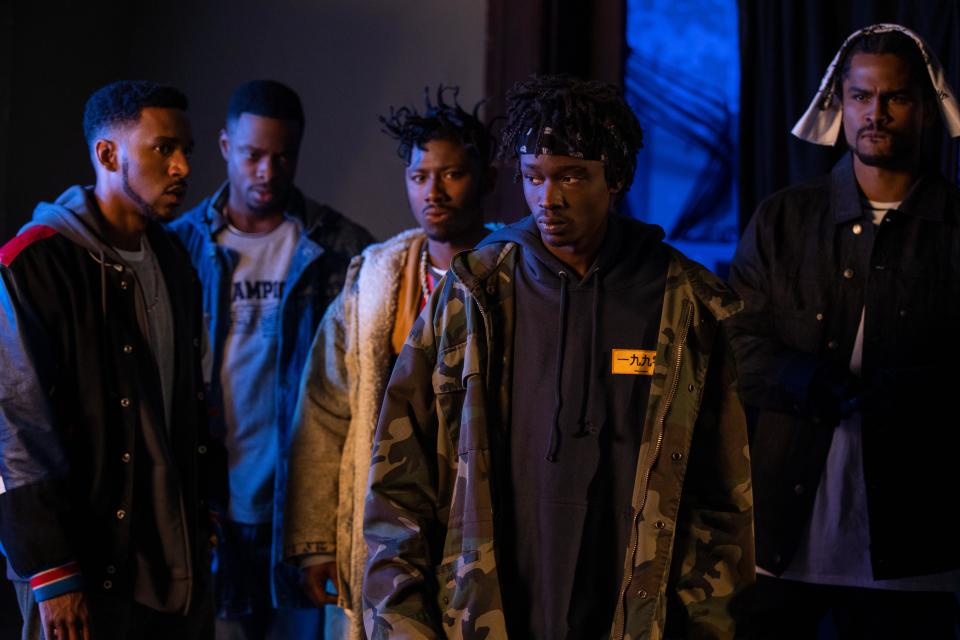
VIBE: What can viewers expect from Season 3 of Wu-Tang: An American Saga?
TJ Atoms: So the Wu-Tang: An American Saga season three, we see what we expect to see from the Wu-Tang Clan. The first two seasons, it was more of what we didn’t know. In this season, it’s more of like shining a light on the family, the perseverance through the adversity, and just them coming together. All in together now.
Dave East: I feel like if you’ve been a fan of the show, if you’ve seen season one, season two… well, [even] if you didn’t see the first two seasons, I feel like this season will make you go back and tap in with the show because it’s really inspirational. It’s motivational. To any kid from the hood, if you ain’t from the hood. From the suburbs, wherever you’re from. I just feel like their story is something that you can apply to your life.
Ashton Sanders: I think that the third season focuses mainly on [how] RZA made these guys sign these five-year contracts. So for him, he’s trying to make sure that all of his guys are successful in the ways that were promised. Like episode one, we’re in this house that we bought, so it’s like a whole new dynamic, you know. It’s money involved. The RZA, for me, as a real person and as me playing as the character, has always been somebody who has been one step ahead.
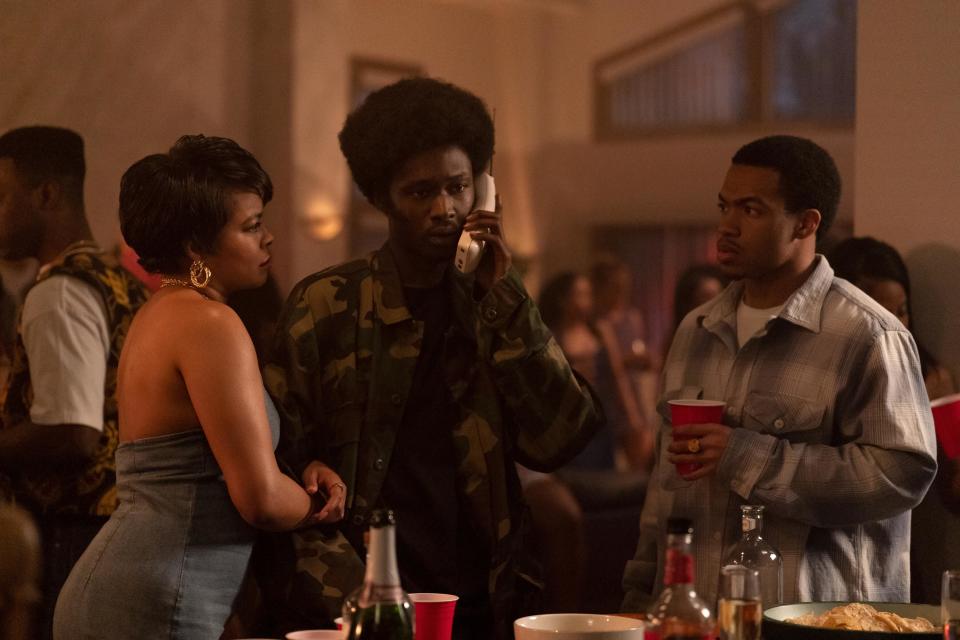
So he’s always thinking about that next step, you know. In terms of producing, yeah, we do see the stresses of him being in his studio and not being able to create sh*t and being frustrated. And then drawing inspiration from something and then that gets exciting, as producers do. So, I think it’s a very real experience that the audience will be getting while watching it, if that makes sense.
TJ Atoms: I wanted them to do the food stamp joint so bad, but we didn’t, man. I’m not gonna lie, but we did go into a lot of different stuff that we won’t be expecting. Like the third episode is completely based in the ‘70s. We get to see the mind of ODB’s inspiration for the album. And in the first two episodes, we get to follow his journey of him leaving the group and kind of doing his own thing. like finding himself, you know.
Chamber Two: The Brotherhood
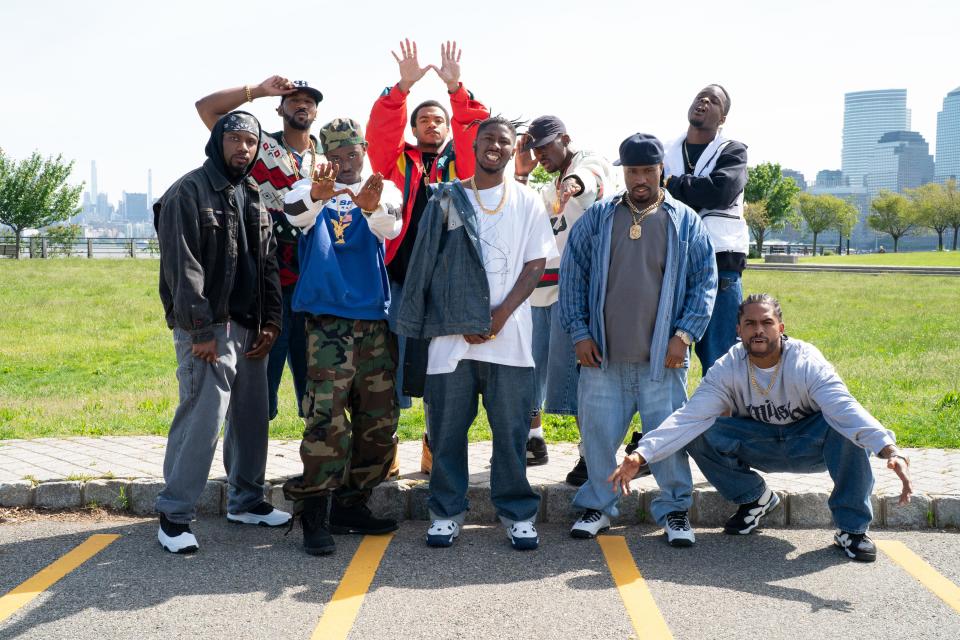
The Wu is built on a brotherhood that’s been challenged on numerous occasions during the first two seasons. How will we see that dynamic continue in Season 3?
RZA: Well, you’re dealing with a challenge when you don’t got nothing and you’re striving to get something, that’s a different type of challenge. What happens when you’ve got something? What happens when you’re successful? So the challenges of success are explored in season three, you know. The good, bad, and ugly of that come to the table.
Shameik Moore: I think we start off with me going to Bobby’s house as a safe space, which I think says a lot. So boom we trust each other. He held my peace and then he found out that I shot at his boy, you know what I’m saying, so now he’s in the middle. I think season two is like you’re friends with everybody. It’s like friends with everybody that’s not my friend. ‘You’re not my friend if you’re friends with him. You can’t be friends with everybody’ is kind of our dynamic. And then it’s like, ‘All right, cool. We’re here, whatever, it’s The Abbot, right? So we’re gonna follow you RZA, since you’ve got the path and whatever. We’re gonna see. This ni**a asking for five years, I’ll give five years.’
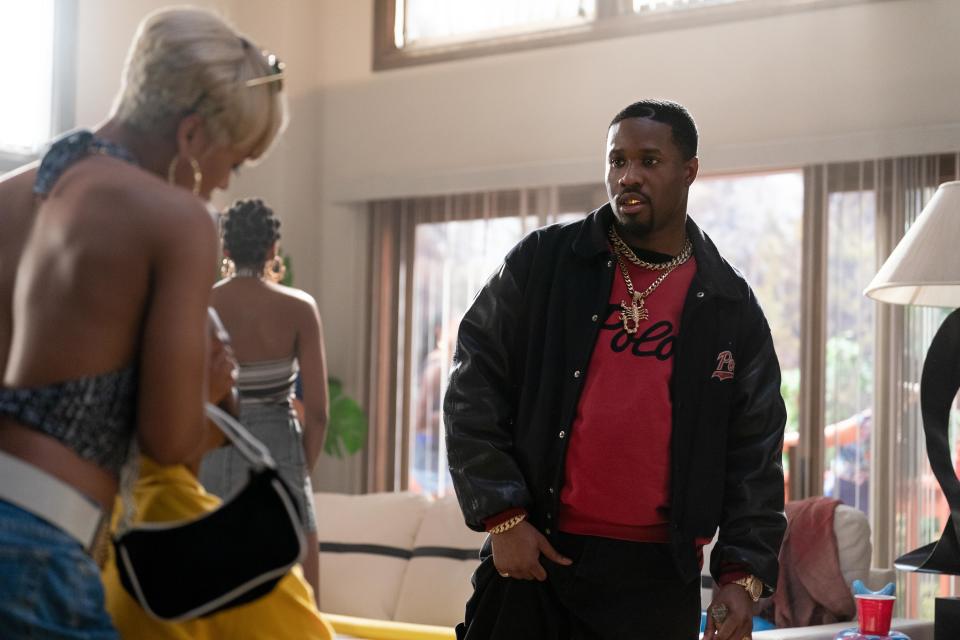
Season 3 is like, ‘Okay, we’re doing it, cool. Now I’m cool with the boy I shot at, so RZA was right so far.’ Now we see it’s competitive, now everybody’s grabbing their nuts. Now I’m like, ‘Okay, it’s my time’ is really the energy. I think our only clash this season was towards the end. I think OG, in reality, had his own vision on where Wu-Tang can go and I think there’s so many young men that joined for different reasons because we’re all from different perspectives and we all connected with the same focal point, which is Ashton, the RZA. So at this point, it’s just like ‘I don’t agree with where you’re taking this brand and I’m good on my own now.’ It’s basically what OG and Ashton have to deal with in season 3 from all of us really. So I think that’s our dynamic here.
Siddiq Saunderson: I think that the challenges that exist within a brotherhood don’t never stop, you know. Especially with people like the Wu, nine headstrong individuals. They got their own unique swagger about them, they all think that they’re the best one in the group type sh*t. There’s always gonna be sort of complications and not seeing eye to eye, but brotherhood is about moving past that and uniting for a common goal and I think that’s what audiences is gonna see this season. It don’t matter how many arguments we get into. It don’t matter if it’s a physical fight or whatever. At the end of the day, we all got a common goal and we’re not gonna stop until we reach it. And I think the audience gets to see them finally living in their glory after seeing how much stuff kind of led up to it.
Chamber Three: The Humanity
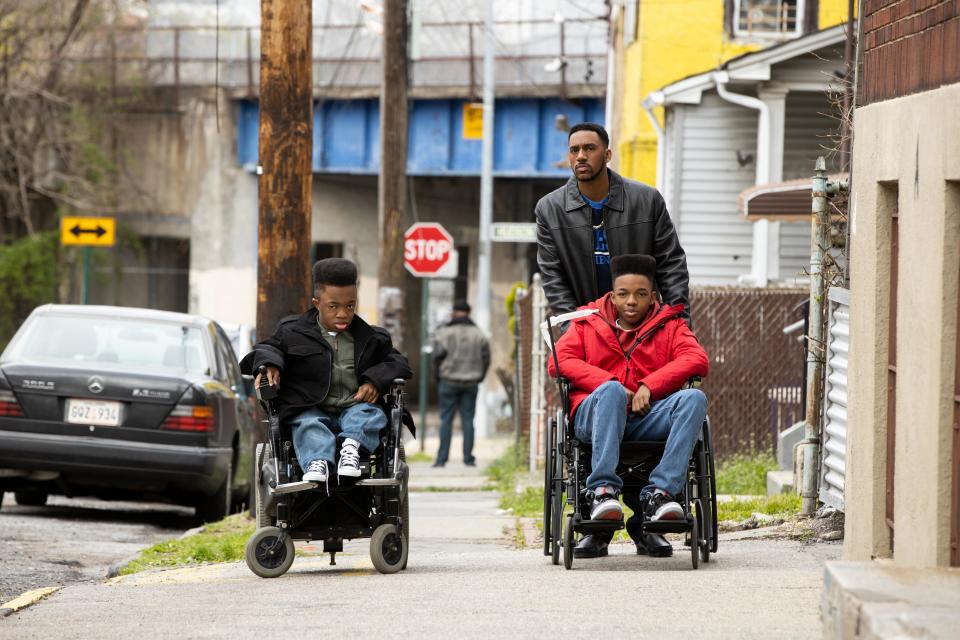
I felt that Wu-Tang: An American Saga did a good job of showing the humanity in the characters beyond the music and being rap stars. Was that a conscious effort?
RZA: Well, I mean, we’re dealing with storytellers. Alex Tse, of course, [is] an established Hollywood screenwriter. Myself, from lyrics and also writing screen[plays]. So we know how to write and narrate the characters but, of course, there’s a human part, we live this. And, of course, when a fan hears a track, they might not even know. They don’t know how you look, don’t know if you’re tall or short, they just live the music. But it’s a blessing to be able to bring you into this world and show you that this music is created by real people and they’re going through those situations. And at the same time, see there’s other people right now that’s creating their music and they’re gonna go through some real situations, as well. And guess what, they look at the Wu and watch out for a few of those landmines.
Zolee Griggs: Yeah, of course, because as you guys are watching me onscreen grow as Shurrie is growing, I’m actually growing with her simultaneously. Granted, not yet, but one day I will have a child. I don’t have a child, but I can pull from being someone’s girlfriend or being someone’s younger or older sister and being someone’s daughter. And I remember when we read the script and it was like ‘Shurrie is pregnant,’ the first person I called is my mother. I’m like ‘Mom, I need you to tell me what it’s like to have a baby,’ you know.
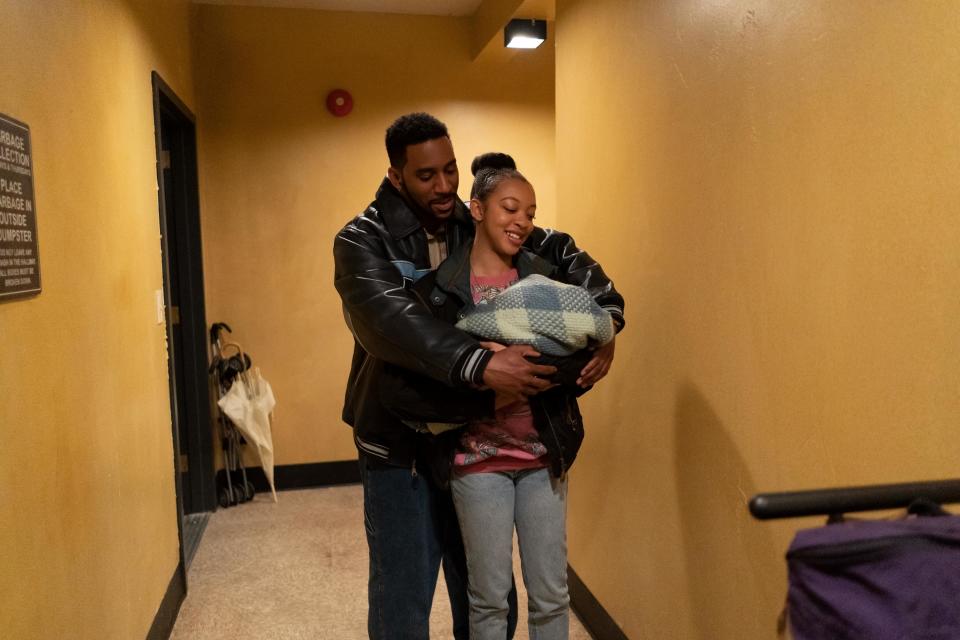
Like pregnancy and all these kinds of things. So, of course, I’m speaking to friends and family and pulling from my own life experiences. Just to help make sure that it’s authentic because younger Shurrie’s life issues aren’t the same as grown woman Shurrie’s. Motherhood aside, her man is in a completely different space and world and realm, so just the grace that comes with it. But she and I had a beautiful transformation if I do say so myself. So we’re here, season 3.
East: Yeah, I did. I can relate to Meth, one hundred percent. We’re not the same person, of course, but I could relate to his journey. I could relate to not giving up. I could relate to everybody [being] against you. I can relate to people doubting you and I mean you’re still pushing through and constantly reaching each goal you set out to reach, you know. So I can really relate to Meth, one hundred percent. So that just made it easier for me to play that role.
Atoms: Yeah. I feel like ODB was going through a lot at the time. So I feel like the most I can relate to ODB in this season is definitely the point of him being completely himself. And really not caring about what people think about him and just being in your face. And I can relate to that.
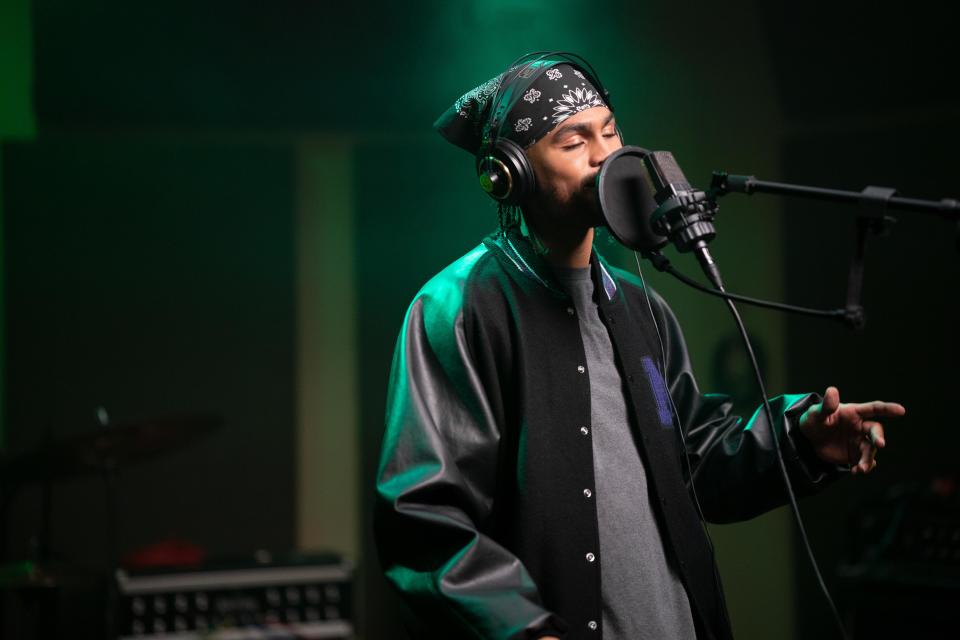
East: Even down to the look. They’ve been calling me Method Man and Chris Brown since I was a high school. So for me to grow up and [play him in the show], it worked out. And what helped me a lot was that I actually have a personal relationship with Meth. So for me to be able to call him and get with him and if I got a show in the city, he popped out, sh*t like that. So we had our own vibe beyond the show so that just made me that much more confident in portraying his life.
I really was learning sh*t about him reading the script and then I would call him and ask him like ‘Is this real?’ Did this really happen? Was you really doing this?’ and he would give me the real, you know? I mean, because the script is the script. I want to know what’s really going on, so a lot of that sh*t was like mind-boggling. I’m like ‘Nah, Meth, you ain’t never played no lacrosse, ni**a.’ I had to call. He was like ‘Nah, I was dead nice in the lacrosse. I’m still nice.’ I’m like, ‘What!?’ So just having that relationship with him made it that much iller.
Chamber Four: The Legacy

This season marks the end of Wu-Tang: An American Saga as a series. How do you feel it will be remembered? What were your favorite memories and what will its legacy be?
Sanders: It’s a legendary show. I mean, I think this show will go down as one of the best Hip-Hop retellings in a long time. I think it’s cool that the success it’s had has been with the younger generation mainly, so we’ve been able to be the faces for the Wu-Tang. But we’re introducing and we’re reintroducing them to people who may not have known them in the way that they do now from watching the show. At the same time, Wu-Tang themselves are getting more relevancy. Like re-upping, everybody going on tours and sh*t, you know what I’m saying? Like everybody’s kind of eating from the success of the show, us as actors and them as the group, so I think it’s done a good job at setting up a legacy for itself that will be remembered as something great. Like damn, they did that, you know?
Griggs: All the times we would hang out offset. That’s why we get to come to set and y’all are like ‘Yo, that was so lit. That was so authentic.’ It’s like ‘Yeah, ’cause we was doing that Friday, Saturday, Sunday, Monday, Tuesday.’ Like, you were locked in with these people for six months straight for the show. But also it’s like I really love these people and I’m really hanging out with these people outside of work. Like we’re really bonding and having a great relationship. So it just makes it that much easier to come to work on a Monday and do it all over again or with like a different set of circumstances. I will forever be bugging my brothers. No matter where we are in the world, if I see them there, I’m going to [say] ‘What’s up.’
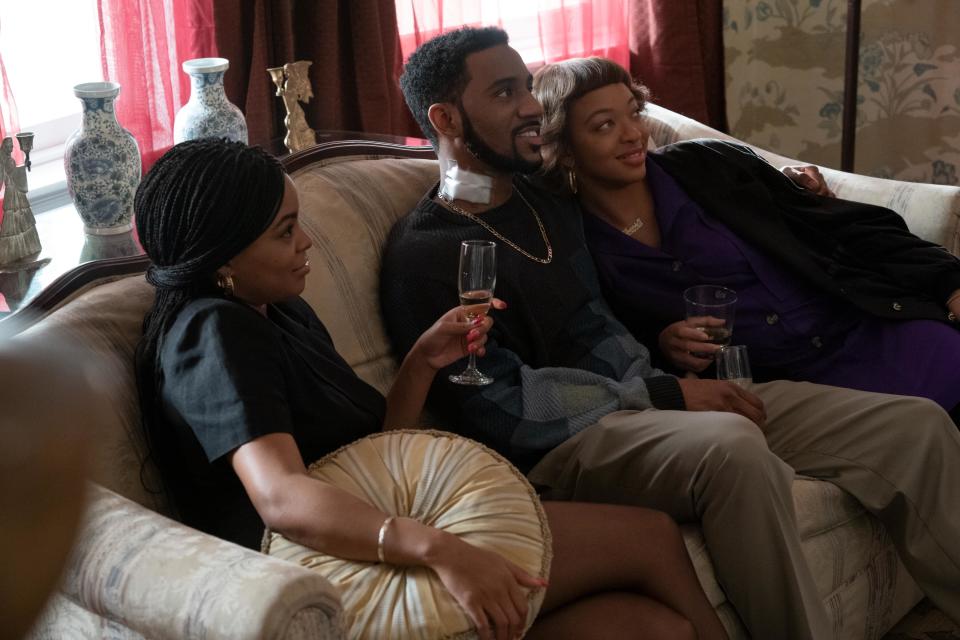
East: I’ma be real with you. I think it’s putting on the new generation. The kids right now that might only see Meth on Power or acting and sh*t like that. The kids that totally missed ODB’s whole presence. It’s kids that’s been born since he died that don’t know nothing about [him]. I grew up with ODB, seeing him on videos. I remember the energy he had when he was here. So I think we’re just reintroducing what them brothers created almost 30 years ago. We’re the faces of what they did if you’re not familiar with their faces. And I think that’s a load to carry, but I think we held that sh*t down for three seasons.
Saunderson: It’s a lot man. It’s like too many to count for real. I think one of them was like season one. This was offset, though. We had a [party]. It was for Shameik’s birthday. We all went out and we was at Tao and it was just kind of crazy because as the characters have gone from the hoods to now driving nice cars and wearing Versace robes, personally, this is my first time coming into money and stuff. And experiencing stuff like going to the back room of a fancy restaurant with RZA and Ghostface and my cast and sh*t like that. So I think for me, it was all about those type of moments because I feel like that’s how we bonded as a cast and then we grew together. We all kind of came up in our own ways and made our own investments and just matured. And I think that is what I will always remember, that kind of family that we’ve created that you see. That the audiences hopefully feel when they’re watching the show.
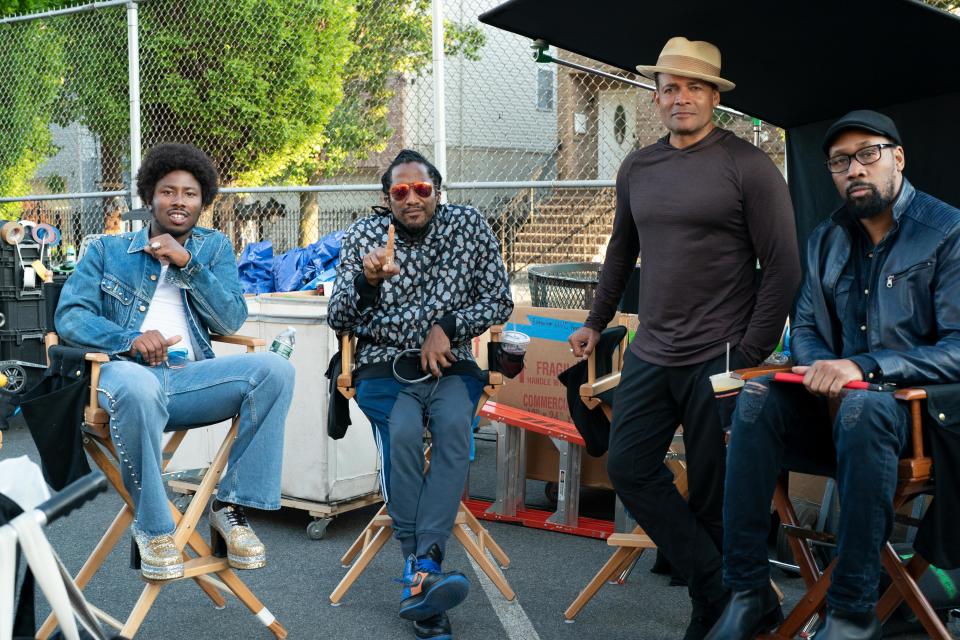
RZA: I mean me and Mr. C, we talked about a lot of things. You know, at one point, I would say Alex was like my therapist because we look at the telling [of] the story, and things are coming out and it’s better out than in, as they say. It’s better to get it out [than] to keep it in, right? But, of course, this is a focused story as well. Even though it’s nine members in Wu-Tang and we go into the Diggs family, we still are focusing on a group of people and you’re watching their journey. I think my cousin might have ran into Alex or spoke to him, like why isn’t he in this show? [It’s] people that want to be part of it, but it ain’t about them, it was about this and it was focused. But yes, there’s some stuff that has to be left on the floor.
Alex Tse: I think legacies aren’t defined by the people who live them or create them, that’s for you guys. All we can do is create something that we’re proud of and we stand by. And I can say, unequivocally, I stand by this show, every frame of it. And in this business, I think that’s a hard thing to say and that’s all we can do. The legacy part is left to you, but we’re very, very proud of it. And I feel like we’ve ended it on our terms.
Best of VIBE.com
